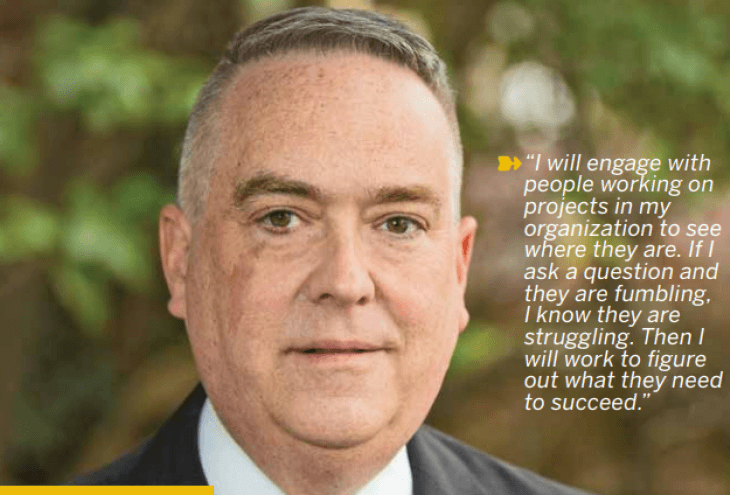When Gary Burnette was finishing up his degree in computer science in 1983, he knew exactly what he wanted to do with it: work at IBM. “There was no better place to be,” recalls Burnette, who remembers poring over glossy IBM brochures that detailed innovations the company was driving. “I was hoping I could get into a company that was advancing technology beyond everyone else and be a part of something on the edge.”
But Burnette had a problem. IBM was not recruiting at his school, East Tennessee State University. So he decided to take matters into his own hands. Burnette wrote a cover letter and sent it with his resume to IBM’s office in Raleigh, N.C. “To my surprise, I got a call for an interview,” says Burnette, this year’s winner of the Executive Excellence Award.
Three-plus decades later, Burnette remains with IBM, where he currently fills the role of vice president, data integration. Within the company’s chief data office, Burnette leads a team incorporating data from companies IBM has acquired into an enterprise-wide platform that can be used to improve IBM’s overall business performance and results. It’s just the latest in a long progression of positions — everything from software developer to marketer to a divisional chief information officer for sales and marketing leading a global team of more than 3,000 information technology professionals — that have given Burnette a unique perspective on how the company actually functions.
Though his positions and responsibilities have changed over the years, Burnette has retained a core philosophy about leadership that is rooted in the trust of those who work for him. “I have a basic belief that most people are here to do their job and to do the best they can,” he says. “I believe their motives are pure, and I don’t have to spend time inspecting to see if that is true.”
Which is not to say Burnette doesn’t believe he has a role to play as an executive. But instead of helicoptering over his colleagues — a practical impossibility when you are leading large global teams with many committed deliverables — Burnette probes and asks questions that reveal how confident they are in achieving whatever goals they have. “I will engage with people working on projects in my organization to see where they are. If I ask a question and they are fumbling, I know they are struggling,” he says. “Then I will work to figure out what they need to succeed.”
Where Burnette has embraced a hands-on approach is in recruiting Native students to join IBM. Burnette is a member of the Cheroenhaka (Nottoway) Indian Tribe of Southampton County, Virginia. The tribe, like most in Virginia, was effectively erased from official local and state records when the state opted to eliminate “Indian” or “Native” as a racial choice in the early 1900s. “That drove the tribes in Virginia underground,” he says. But around 2000, the inactive tribe began to reestablish itself, and Burnette was eager to get involved by joining the tribal council and volunteering his time and talents to forge new connections. Recently, the tribe purchased nearly 400 acres of what once had been its reservation in the mid1800s. “It’s very cool to walk that land and know it’s where our ancestors lived,” he says.
At IBM, Burnette is co-chair of the corporate Native American Diversity Group and executive sponsor for the group’s Raleigh organization. For Burnette, the work for his tribe and work for his company are connected. “Once I got active on the tribal side, I tried to translate that into IBM,” he says. To increase the pipeline of Native students coming to IBM, Burnette and his colleagues in the diversity group took the list of all the schools where IBM recruits and cross-matched it with AISES Chapters at the schools as well as Native IBM employees who are alumni. “We created a champions network internally, and their job was to reconnect with the AISES Chapter at their school and go out and drive interest in those communities about working at IBM,” he says.
Looking back on his long tenure at IBM, Burnette can’t claim to have once imagined all the ways his career has actually evolved. And he is still gratified that he took the initiative to write that cover letter so many years ago. “I have had the opportunity to work on many interesting things, travel globally, and see firsthand how we operate as an international company and make a difference in our performance and results through implementing key projects,” he says. “I continue to learn new things, and all this certainly gives me a sense of pride in my time at IBM.”











